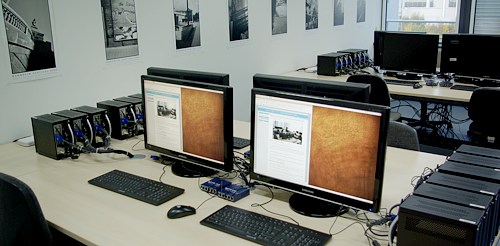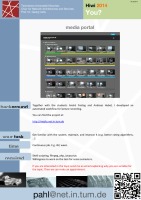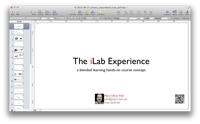iLab — a new course form
In 2013 the iLab-concept was awarded with the Ernst Otto Fischer-Lehrpreis (teaching price) of Technische Universität München!
The iLab didactical concept is a special blended learning methodology. It reflects the learning of an "ideal" student. It starts with a lecture. Then students go through an individual self-learning phase where they deepen the previously heard lecture knowledge. In this phase students self-study prepared content within a special eLearning system. As third phase students assemble in teams of two and do a practical hands-on in the lab. There the newly learned or refreshed theoretical knowledge is practically applied. In addition to the three described weekly phases each student takes an oral attestation after half of the course and at the end. This ensures that students have a look at the content for a fourth time (lecture, self-study, team hands-on, oral attestation).
The iLab concept is currently applied in two different iLab courses at TUM that run in parallel (iLab - build your own Internet, iLab - you set the focus). The iLab didactical concept is built around a customized open source eLearning solution. Since 2004 Marc-Oliver Pahl continuously develops the concept and the software together with changing instructor teams. At Tübingen Uwe Bilger and at TUM Benjamin Hof, Lukas Schwaighofer, and Stephan Günther made particularly strong contributions to the courses.
Since the establishment of the eLearning blended learning design more than 1000 students participated. They acquired knowledge about computer networks and distributed systems through the iLabs and their special didactical concept. From the beginning the student feedback is extremely positive. A typical remark is that the course is very time and labor intense for the 10 ECTS it is valued. However, the revenue in acquiring knowledge and having fun doing so would compensate that very well.
A survey of students that participated in the iLab and had finished their University studies years ago resulted in multiple feedbacks that the iLab content would still be remembered and that it would be very well applicable in the daily industry work. This shows how suitable the topic selection is and how well the teaching methodology works.

The iLab and the iLab2 are multiple things at once:
- Practical exercises that are continuously running at several Universities attracting more than 1800 students until the end of 2016.
- An innovative course design for practical exercises that consists of
- A special didactical concept.
- A web-based platform that is fully tailored to the concept.
- Interesting content that follows the concept.
Here you can find the presentation to a talk about the didactical concept of the iLab I gave in 2013.
The iLab concept was developed by me in 2003 and refined over the following years. It supports students in their self-learning process by gently forcing them to prepare well to master the hands-on parts of the exercises in an optimal way.
The concept has proven to lead to much better student satisfaction than comparable course concepts. This is expressed by the enormous popularity the course has at all Universities we introduced it (first of all Technische Universität München with around 60 students per semester, and Universität Tübingen with around 20 students per semester).

